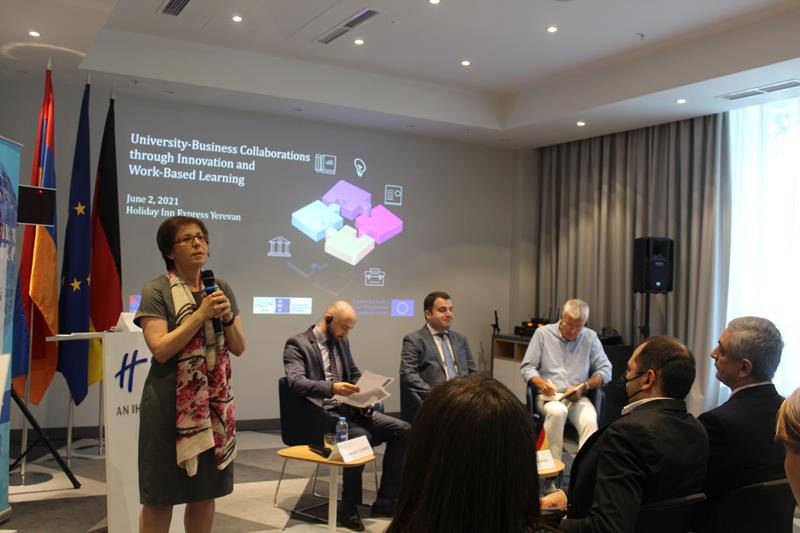Cluster Meeting “University-Business Collaborations through Innovation and Work-Based Learning”
On 2 June 2021, the National Erasmus+ Office in Armenia (NEO-Armenia) together with the German Business Association (DWV) organized a Cluster Meeting under the theme “University-Business Collaborations through Innovation and Work-Based Learning.”
NEO-Armenia Coordinator Lana Karlova greeted the participants of the Cluster Meeting on behalf of the Office and DWV. Opening remarks were made by Stanislav Toshkov, Programme Manager from the EU Delegation in Armenia, Karen Trchounian, Deputy Minister of RA Ministry of Education, Science, Culture and Sport, and Klaus Wendelberger, Deputy Ambassador of German Embassy in Armenia.
The first Plenary Session on “Knowledge and Technology Transfer between University, Industry and Society” was moderated by Meri Navasardyan, Managing Director of DWV. The keynote speakers were Davit Sahakyan, Deputy Minister of RA Ministry of High-Tech Industry, Vardan Gevorgyan, Head of innovation division at National Center for Innovation and Entrepreneurship at RA Ministry of Economy, and Artavazd Minasyan, Co-founder of Krisp, Union of Advanced Technology Enterprises (UATE) Board Member.
The speakers placed special emphasis on the importance of promoting and developing cooperation between higher education and business, taking into account current development trends and opportunities, particularly in the research field. The attendees had a chance to learn about the ongoing activities of the Ministries towards the formation of interuniversity accelerators and incubators, technology transfer centers, as well as challenges and obstacles along the way.
The main achievements, experience and best practices of the following Erasmus+ projects were presented during the session entitled “University-Industry Collaboration Practices within the framework of Erasmus+ CBHE projects”:
- Enhancing innovation competences and entrepreneurial skills in engineering education (InnoCENS) – Amalya Mkhitaryan, Director at Armenian National Engineering Laboratories, National Polytechnic University of Armenia
- Fostering University-Enterprise Cooperation and Entrepreneurship of Students Via Smart Caffes (SMART), Connecting universities-industry through smart entrepreneurial cooperation & competitive intelligence of students in MD, GE and AM (CONNECT) – Ani Hovsepyan, Career Center Specialist, Brusov State University
- Armenian Network of Excellence in Bio-Products Science and Technology (ABIONET) – Gayane Marmaryan, Associate Professor, Armenian National Agrarian University
- Development of a flexible, innovative and practical framework for Work-based Learning in higher education of Armenia and Russia (FlexWBL) – Kristina Tsaturyan, Head of External Affairs and International Cooperation, Brusov State University, Erasmus+ Higher Education Reform Expert (HERE-Armenia)
- Introducing work-based learning in higher education systems of Armenia and Moldova for better employability of graduates (WBL4JOB) – Arayik Navoyan, Vice Rector of French University in Armenia, HERE-Armenia Coordinator
The Cluster Meeting concluded with a Panel Discussion “University-Business Partnerships: Challenges and Opportunities” moderator by Ruben Topchyan, Director of National Center for Professional Education Quality Assurance, HERE-Armenia. The panelists were: Vardan Urutyan, Rector of the Armenian National Agrarian University; Hasni Kosejian, Berlin Optics, DWV board member; Arsen Arakelyan, Director of Research Institute of Molecular Biology; Suzanna Shamakhyan, VP/Director on Partnerships and Programs at Foundation for Armenian Science and Technology (FAST); Karen Navoyan, Germaninvest Private Equity, DWV board member, and Bahareh Fatemi, Senior Project Manager at EU TUMO Convergence Center.
At the end of the meeting, recommendations and suggestions were made to the representatives of the government, universities, as well as the business sector. The main challenges raised by the participants were related to the legislative gaps, lack of motivation among students and employers, the need for technical descriptions of specializations, adequate distribution of theoretical-practical components in educational programs, lack of incentive mechanisms, etc.

